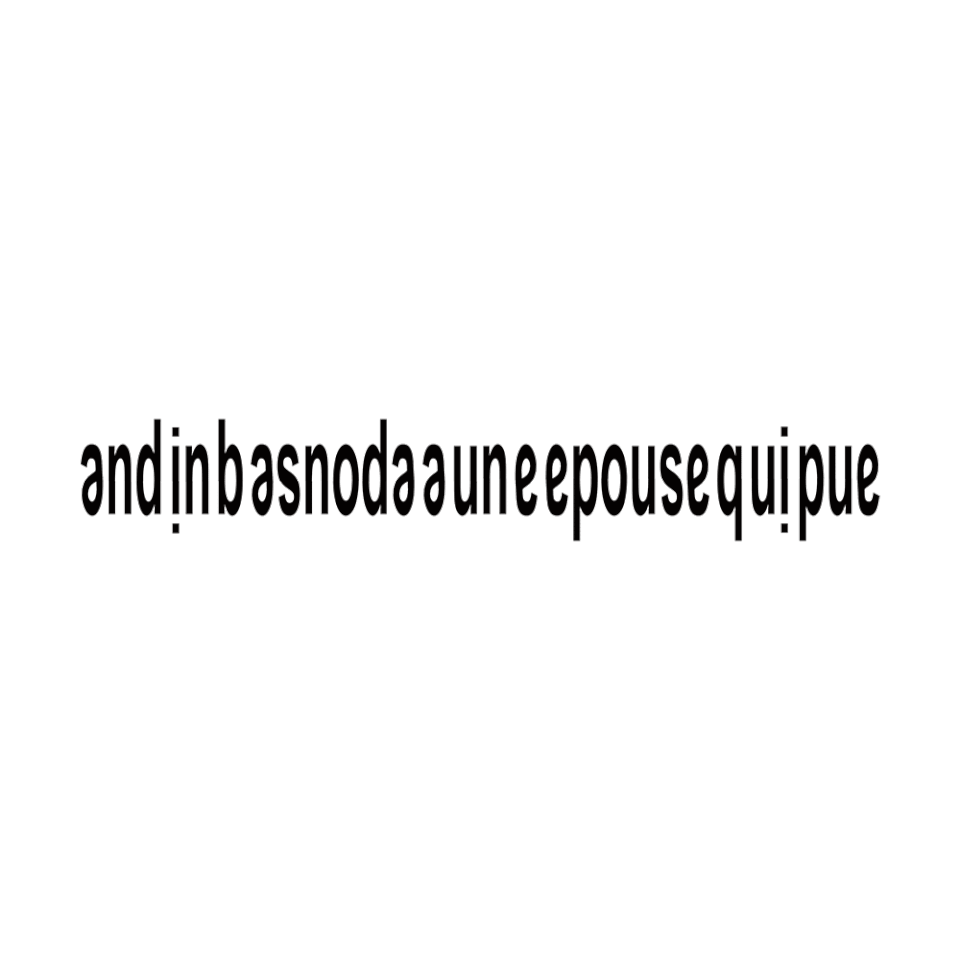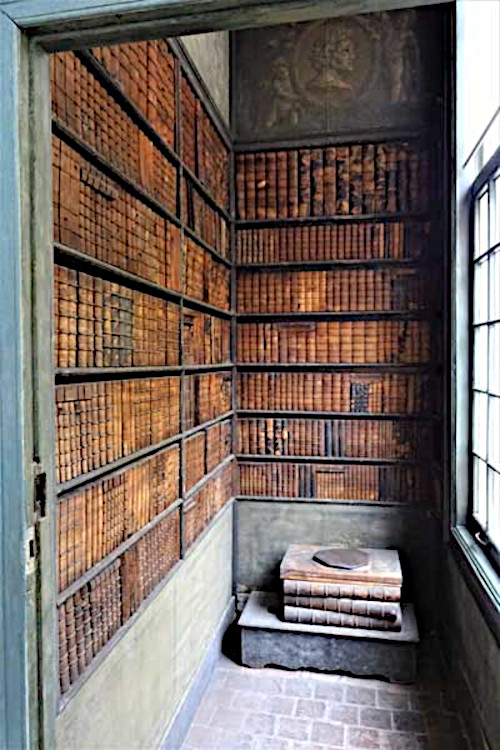
Georges Perec worked out that the French phrase andin basnoda a une epouse qui pue (“Andin Basnoda has a smelly wife”) reads the same upside down.
Typographer Pierre di Sciullo created a typeface to honor this ambigram — he called it Basnoda.

Georges Perec worked out that the French phrase andin basnoda a une epouse qui pue (“Andin Basnoda has a smelly wife”) reads the same upside down.
Typographer Pierre di Sciullo created a typeface to honor this ambigram — he called it Basnoda.

By Nevit Dilmen. How many sticks do you see?
Drive east along the shore of Lake Erie toward the town of Port Colborne, Ontario, and the mill before you appears to shrink, rather than grow, as you approach.
Similar: The Rowes Wharf Arch Anomaly:
See The Vista Paradox.

In 1772, wool merchant François Adrien Van den Bogaert commissioned a garden pavilion for Den Wolsack, his house in Antwerp. On the first floor is a bibliophile’s lavatory, in which the bowl is concealed in a fancifully rendered stack of books.
The volumes on the surrounding shelves aren’t real; they’re made of wood covered with leather.
(Thanks, Serge.)
Charles Craik of Weston-super-Mare received this enigmatic postcard from a friend in 1901 and sent it on to the Strand:
I think it rather cleverly done, and it took me some time before I could understand its meaning.
The principal message is on the big island in the centre of the map — an invitation to meet the sender at a café, with the day. The name of the island below on the left-hand side is at once translated, ‘If so, do.’ The names of the land at the bottom of the map are meant for ‘Same time and place as before’ and ‘Don’t let anything hinder you’ respectively.
The following is a translation beginning at the top and working to the right: ‘Straights of cash. If you don’t come, all sorts of ills befall you. Come early. Let me know if you can come or not. I say, there’s a peculiar thing! You’re getting it by degrees. Can’t you see? Bay rhum. Get your hair cut! Deuced bad straights. See you later. Don’t you see? Devil take you. You are a merry cus! Good old flipper. Love to all. Oh! Tut, tut. R.S.V.P. Yours ever, Guy.’
But despite the gaiety of his song, Balso did not feel sure of himself. He thought of the Phoenix Excrementi, a race of men he had invented one Sunday afternoon while in bed, and trembled, thinking he might well meet one in this place. And he had good cause to tremble, for the Phoenix Excrementi eat themselves, digest themselves, and give birth to themselves by evacuating their bowels.
— Nathanael West, The Dream Life of Balso Snell, 1931
Unusual personal names collected by the Society for the Verification and Enjoyment of Fascinating Names of Actual Persons, listed by curator Allan Fotheringham in 1991:
SVEFNAP founder Clyde Gilmour dreamed of assembling a golf foursome of Luke Feck, Bosh Stack, Fice Mork, and M. Tugrul Uke. “Gilmour imagined himself doing the introductions: ‘Feck, this is Stack. Stack … Mork. Mork … Uke. Uke … Feck …”
A man of the State of Chêng was one day gathering fuel, when he came across a startled deer, which he pursued and killed. Fearing lest any one should see him, he hastily concealed the carcass in a ditch and covered it with plantain leaves, rejoicing excessively at his good fortune. By and by, he forgot the place where he had put it, and, thinking he must have been dreaming, he set off towards home, humming over the affair on his way.
Meanwhile, a man who had overheard his words, acted upon them, and went and got the deer. The latter, when he reached his house, told his wife, saying, ‘A woodman dreamt he had got a deer, but he did not know where it was. Now I have got the deer; so his dream was a reality.’ ‘It is you,’ replied his wife, ‘who have been dreaming you saw a woodman. Did he get the deer? and is there really such a person? It is you who have got the deer: how, then, can his dream be a reality?’ ‘It is true,’ assented the husband, ‘that I have got the deer. It is therefore of little importance whether the woodman dreamt the deer or I dreamt the woodman.’
Now when the woodman reached his home, he became much annoyed at the loss of the deer; and in the night he actually dreamt where the deer then was, and who had got it. So next morning he proceeded to the place indicated in his dream, — and there it was. He then took legal steps to recover possession; and when the case came on, the magistrate delivered the following judgment:– ‘The plaintiff began with a real deer and an alleged dream. He now comes forward with a real dream and an alleged deer. The defendant really got the deer which plaintiff said he dreamt, and is now trying to keep it; while, according to his wife, both the woodman and the deer are but the figments of a dream, so that no one got the deer at all. However, here is a deer, which you had better divide between you.’
— Herbert Allen Giles, A History of Chinese Literature, 1927
A dentist spotted a deadbeat patient while dining at his country club one evening. He called the patient aside, reminded him that he owed him $250 for work done more than two years earlier, and insisted the man pay up. To the dentist’s astonishment, the patient pulled a checkbook from his pocket and wrote a check to the dentist for the full amount.
Skeptical about the patient’s good faith, the dentist went directly to the bank the next morning and presented the check for payment. The teller handed it back with the explanation that the patient’s account was a little short of the amount of the check. Following a few minutes of good-natured conversation the dentist learned that the man’s account was twenty-five dollars short of the needed amount. The dentist smiled, went to the customers’ desk for a few minutes, came back to the teller, deposited thirty dollars to the account of the patient, and then again presented the check for $250 and walked out with a net gain of $220.
— Ralph L. Woods, How to Torture Your Mind, 1969
Jones had been greatly depressed; he declared himself a murderer, and would not be comforted. Suddenly he asked me a question. ‘Are not the parents the cause of the birth of their children?’ said he. ‘I suppose so,’ said I. ‘Are not all men mortal?’ ‘That also may be admitted.’ ‘Then are not the parents the cause of the death of their children, since they know that they are mortal? And am I not a murderer?’ I was, I own, puzzled. At last I thought of something soothing. I pointed out to Jones that to cause the death of another was not necessarily murder. It might be manslaughter or justifiable homicide. ‘Of which of these then am I guilty?’ he queried. I could not say because I had never seen the Jones family, but I hear Jones has become a great bore in the asylum by his unceasing appeals to every one to tell him whether he has committed murder, manslaughter, or justifiable homicide!
— Rueben Abel, ed., Humanistic Pragmatism: The Philosophy of F.C.S. Schiller, 1966